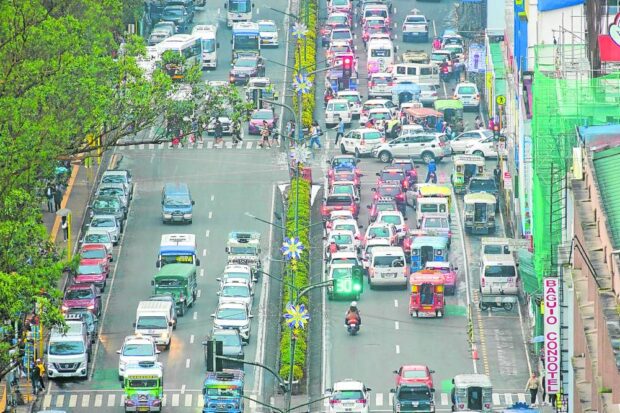
GRIDLOCK Congestion in Baguio City has become too big it can affect the summer capital’s economy with gridlocks becoming a normal occurrence. Infrastructure giants have offered solutions
in partnership proposals with the city government. —NEIL CLARK ONGCHANGCO
BAGUIO CITY—The developers of Metro Manila’s subway, Singapore’s traffic management system, and Luzon’s expressways outlined their plans for redeveloping the heavily congested summer capital into a “smart city” and sparing it from urban decay at a two-day public-private partnership (PPP) summit this week.
Construction giants Metro Pacific, Megawide and Metro Global Holdings are among the country’s major investors negotiating with the city government about putting up an electric monorail serving downtown Baguio and neighboring Benguet towns, an AI (artificial intelligence)-powered mobility system to make traffic and mass transportation more efficient, a centralized transport terminal and a new public market.
On the first summit session on Wednesday, former transportation undersecretary Mark de Leon, now vice president of Metro Pacific Investments Co., said road congestion and its impact on the economy and the environment were among Baguio’s key urban problems which the developers offered to solve.
Baguio was built by the American colonial government in the early 1900s and was designed for 25,000 people. But a 2019 urban carrying capacity study estimates that many of Baguio’s resources like water, woodlands and buildable spaces are no longer sufficient for its current population of 360,000.
‘Inefficient, unreliable’
“Your road networks can’t accommodate the additional number of vehicles coming up during holidays,” De Leon said, partly due to what he described as “inefficient and unreliable public transportation.”
“Sometimes tourists already think twice about going to Baguio because of that problem,” he added.
But an urban poor organization asked why Baguio appeared to be relying on private sector capital.
“We encourage the city to demand higher budgets (from the national government to finance) public utilities and services instead of PPPs,” said Daisy Bagni, secretary general of Ornus.
Mayor Benjamin Magalong said he and a group of anticorruption mayors were fighting to secure their localities’ proper share of national taxes so local governments could finance more projects themselves.
Local governments have been able to access only a smaller percentage of their annual national tax share, Magalong said, because other officials, including lawmakers, control the disbursement of the rest of the funds.
Unsolicited solutions
The summit presented “unsolicited” proposals which are being reviewed or are subjects of negotiations. De Leon said these proposals were pitched independently but were parts of an overall cure to Baguio’s “pain points.”
Metro Pacific, which built and operates tollways like the North Luzon Expressway, is investing in the “Baguio Smart Urban Mobility Project,” which would regulate traffic flow using a unified dispatching system for jeepneys, minibuses and taxis and an online platform that directs motorists away from congested roads or guides them to the nearest parking facility.
Metro Pacific has tapped the system developed by Singaporean firm ST Engineering. It is also introducing a congestion fee to be collected from motorists should they drive through “pre-identified congestion areas” at certain times of the day.
De Leon said urban mobility would benefit from a “Baguio City Intermodal Terminal,” which was discussed at the summit by Matthew Jaramillo, business development officer of Megawide Construction Corp., which put up the Parañaque Integrated Terminal Exchange and won the bid for Phase 1 of the Metro Manila Subway project.
Jaramillo said the proposed central terminal would serve inbound and outbound buses.
De Leon said the “Baguio City Sky Shuttle Project” of Metro Global Holdings Corp. also improves urban mobility. The company has offered to build an P11-billion electricity-driven train that would use an elevated monorail system that would improve air quality and reduce Baguio’s carbon footprint, according to Jaime Cacho, president of the affiliate firm, Metro Global Renewable Energy Corp.
According to Cacho, his company is building a “circular economy” in the city because the train could be fueled by power generated by a waste-to-energy plant which Metro Global is developing with Baguio in the Benguet town of Sablan.
His company, on Oct. 2, signed a memorandum of agreement with Magalong that makes the city a prime resource for the plant’s demand for solid waste.